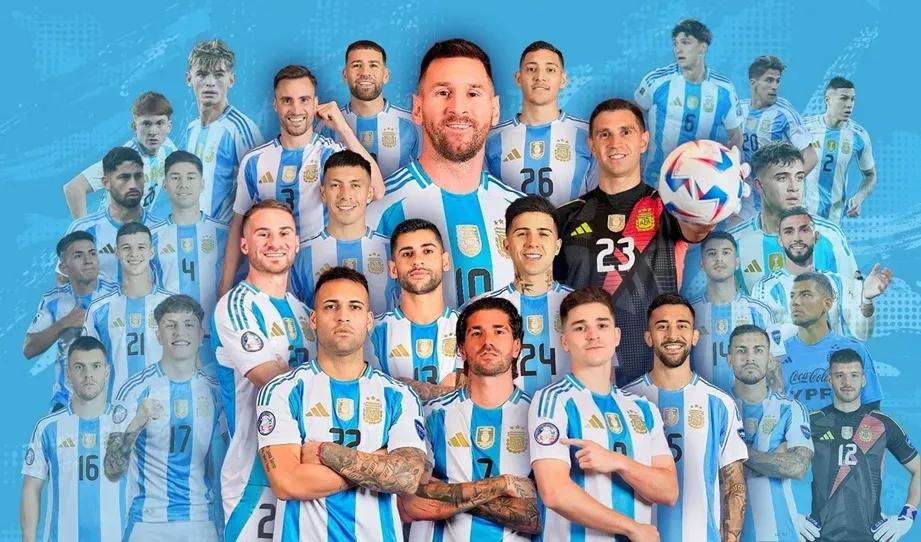Gustavo Ronzano for Poder & Dinero and FinGurú
Winning after winning, building new objectives, renewing ambitions after having conquered the sky, that is the greatest merit of the Argentine national team. And the validity of their success offers three essential interpretations: the world champion of 2022 continues to be the best team on the planet, has already become the best in the history of Argentine football, and positions itself as the top favorite to win the 2026 World Cup.
Those turbulent days in Bronnitsy are now far behind. Before, during, and after the 2018 World Cup in Russia, everything went wrong. When the main assistant coach Jorge Sampaoli, Sebastián Beccacece - now the coach of Ecuador - tried to give Lionel Messi a signal during training and the star got upset, it was the beginning of the end of the fourth World Cup lost by the Inter Miami star.
Lionel Scaloni, Sampaoli's second assistant at the time, later became the cornerstone of a bold bet to initiate the reconstruction.
And the good relationship between the two Lionels, Messi and Scaloni, was the foundational stone of the most successful cycle in the history of the Argentine national team.
Claudio Tapia, president of the AFA, was the third axis of this change in direction. With disorganization and much to correct in domestic football, clarity settled over the National Team. Everyone found their role, no one overstepped boundaries, Tapia called upon a national hero like César Luis Menotti to advise from his experience, Scaloni surrounded himself with silent, humble, hardworking assistants starting with Pablo Aimar, Walter Samuel, and Roberto Fabián Ayala, all former national team players. And Messi focused on the game. He no longer argued as he did with Beccacece nor complained about long flights or uncomfortable hotels. He began to detach from all logistics to endure on the field. Because time kept running, and he could not afford any more distractions. Qatar had to be for Argentina.
But it wasn't only Messi, Scaloni, and Tapia who understood it this way. The rest, a group of elite players, intelligent, knew they could reach the great objective if each contributed their part for the good of the team.
And almost at the same time that powers like Brazil (the five-time champion) were facing more problems than stars, Argentina was being assembled. And it conquered the Copa América precisely at Maracanã, during a pandemic, and the Finalíssima against Italy, and the Qatar World Cup, and once again the Copa América (now in the United States) and managed to qualify for the 2026 World Cup with a crushing performance in the South American qualifiers.
Oscar Ruggeri, world champion in 1986 with Diego Maradona as standard-bearer, said: "This current National Team is the best of all. Because it does not settle. It wants more. And more. And it achieves it. We did not play so well again after being world champions."
When Argentina, led by Marcelo Bielsa, was heading towards the 2002 World Cup, it had players at the top of global recognition a year before the competition. For example, Juan Sebastián Verón, at Manchester United, was one of the best footballers in the world at that moment.
But the National Team went overboard, started the 2002 Korea-Japan World Cup with many injured players, and the substitutes did not have the same quality as the starters. Today, looking ahead to the 2026 World Cup in the United States, Canada, and Mexico, it is different. Argentina not only has a good team: it has a great roster.
What occurred in the last double FIFA date (1-0 over Uruguay in Montevideo and 4-1 against Brazil in Buenos Aires) is a summary of that concept. Not only was Messi absent. Lautaro Martínez, Gonzalo Montiel, Paulo Dybala, and Giovani Lo Celso were also unavailable, all injured. And yet Argentina shone again. They won an away classic and in the other, at home, caused something that had never happened: Brazil conceded 4 goals in a qualifying match for the first time in its history.
Messi prolonged his global reign for two decades. The Albiceleste national team has stars, conviction, mental strength, and a change of hierarchy.
Its titles, but also its high-level football, continuity over the years, and its relevance make this the best Argentine National Team of all time.
Gustavo Ronzano. Journalist
Digital Media of the Argentine Public Television. Contributor to La Nación Deportes.
Former Editor-in-Chief at Clarín newspaper. Covered sports, political, and social events, from earthquakes to World Cups. As a special correspondent, he has been throughout South America, Mexico, the United States, Italy, Spain, France, Switzerland, Greece, Russia, England, Tunisia, Libya, South Africa, China, Korea, Qatar, and Japan, a country he visited five times.
Worked at the Italian news agency ANSA, at Canal Metro de TV, FM Identidad, FM Milenium, on the DirecTV Sports website, and at the German press agency DPA.
Author of the book El Beto, the autobiography of former footballer Norberto Osvaldo Alonso, published by Planeta.


Comments